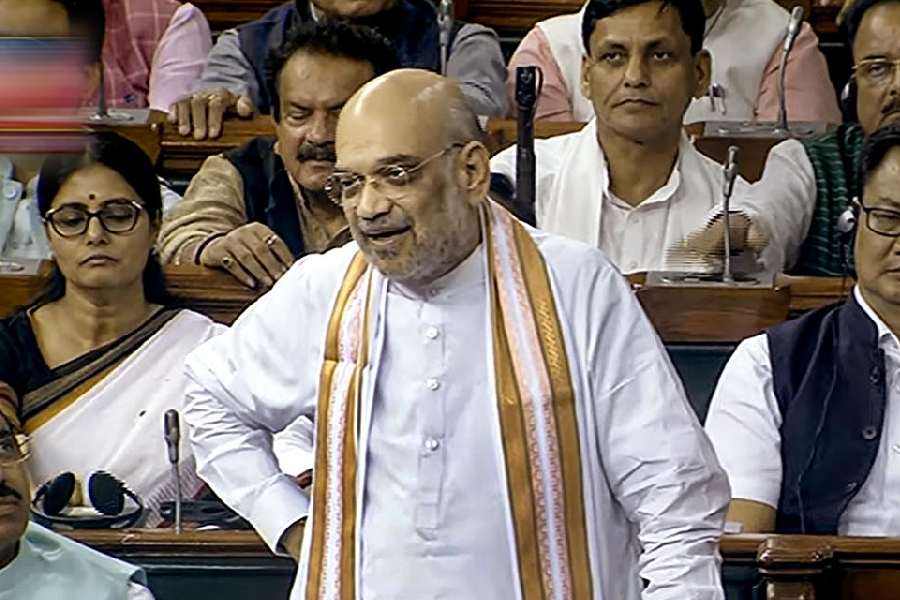I’ve waited to be sure of what I want to say. I’d rather be late than inaccurate. But now that I am, I’m confident of what I’m about to state.
Last week, when the Union home minister spoke about Manipur, he erred. I’d say Amit Shah focused tactically on what at the moment seemed to him the right thing to say but overlooked or ignored what was strategically more appropriate for Manipur’s future. Sadly, politicians often make such mistakes.
The first error was his defence of chief minister Biren Singh. The home minister argued that he could not dismiss him because he has been cooperating. He’s agreed to replace the chief secretary and director-general of police and he’s also accepted a security adviser.
But how could he possibly have refused? When the home minister of India asks a member of the BJP to accept an instruction, cooperation is to be expected. Anything else would be defiance. More important, cooperation is not synonymous with competence.
The truth that no one can deny is Manipur has been troubled for a hundred days and the chief minister has failed to restore law and order, leave aside harmony. How much more time is the home minister prepared to give him? And at what stage does his failure become undeniable? Surely we’ve reached the point where retaining him makes the central government complicit.
The truth is Biren Singh may be cooperating but he’s lost the confidence of the entire Kuki community, which is 16 per cent of Manipur. They distrust him and believe he’s anti-Kuki. This means he’s an obstacle to peace. And that is the reason to remove him.
I suspect a different narrative took precedence for Shah. It’s also undeniably true that just as the Kukis detest him, Biren Singh is now admired, if not adored, by the Meiteis. They see him as their champion. Pramot Singh, the chief of the Meitei Leepun, hero-worships him. For the Arambai Tenggol, he’s their patron. So removing Biren Singh would offend the Meiteis and the BJP could lose their support. Since they’re 53 per cent of the population, in electoral terms they count more than the Kukis.
However, what the home minister deliberately overlooked — and perhaps many of us no longer recall — is that his legislature party in Manipur is close to losing confidence in their chief minister. As far back as May, all seven BJP Kuki MLAs publicly expressed their lack of confidence in Biren Singh. In June, eight BJP Meitei MLAs submitted a memorandum to the Prime Minister’s Office claiming “(the) public have lost complete faith in the present state government”. That’s 15 out of the party’s 32 MLAs. I wonder why the home minister ignored them.
The second error was to argue in his speech in the Lok Sabha on Wednesday — and I’m now quoting from The Indian Express newspaper — that “the origin of the current cycle of ethnic violence… (is) an influx of Kuki refugees from Myanmar following the regime change in 2021.” The paper says he continued: “As there is no border fencing a large number of Kuki brothers came to Manipur… as the Kuki refugees settled down in the forests of the Manipur valley, there were fears of a demographic change.”
That is certainly one of the elements that underlie the present crisis. I won’t deny that. But should this have been the core of the home minister’s explanation?
There are three reasons for saying “no”. First, even the state government accepts that the number is under 3,000. In contrast, Mizoram has received nearly 45,000 refugees from Myanmar. Second, this is a Meitei narrative. For the home minister to adopt it seems akin to taking sides.
Third, to claim these refugees, fleeing in fear from the junta in Myanmar — and let’s not forget that — have “settled down in the forests of Manipur” and created “fears of demographic change” is both to exaggerate and exacerbate their impact — indeed, hugely — and, once again, echo and enlarge the Meitei narrative.
No wonder all 10 Kuki MLAs, seven of whom are from the BJP, issued a statement of dissent on the 11th. It says: “It’s disheartening that the Union home minister should state in Parliament that the ethnic cleansing on Kuki-Zomi-Hmar people is a disturbance caused by infiltration from Myanmar, post the 2021 junta takeover.”

NCP leaders during a visit to a violence-hit area of Manipur on August 9. PTI picture
They point out that the home minister has ignored the fact that Meitei organisations have called Kukis “foreigners” and branded their community “poppy planters”. This, the MLAs say, “fuelled animosity between the two communities (but has) been ignored by the HM in his statement”.
Once again, it’s difficult not to believe the home minister was aligning his analysis with that of the Meiteis. Perhaps this was the argument given to him by Biren Singh. If so, the chief minister led him into an unfortunate but embarrassing error. It illustrates and emphasises how seemingly one-sided the home minister’s analysis is.
On Wednesday, he said the influx of Kuki refugees from Myanmar was a result of the fight between the Kuki Democratic Front and the Myanmarese military junta. Hours later, the Kuki National Organisation wrote to the Speaker of the Lok Sabha to say: “No such Kuki unit by the name of KDF exists in Burma.”
That’s not all. The letter, written by the President of the KNO, Letlam, also says: “I am to affirm hereby that there is no movement of any of our units in Indian territory…. The allegation seems to be nothing but a figment of the imagination of the Manipur administration in pointing a scapegoat for its failures.”
Now ministers in Parliament do make errors. But one would expect that at such a critical time and whilst delivering a long-awaited explanation of the Manipur crisis, the home minister’s analysis would be faultless, factually accurate and preponderantly undeniable. That wasn’t the case on Wednesday.
The home minister should have reached out to both the warring communities in Manipur. That was, arguably, the most important task he had. He certainly embraced the Meiteis but he seems to have upset and offended the Kukis. If his arm went around the former, his hand seems to have pushed the latter further away. This is why he erred.











